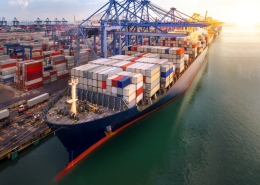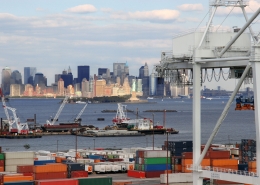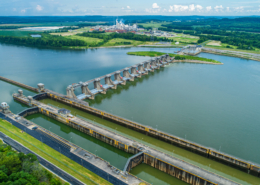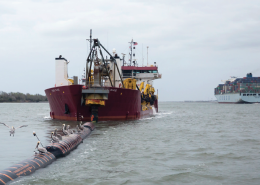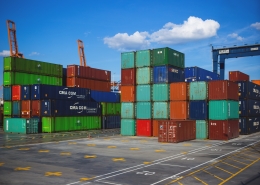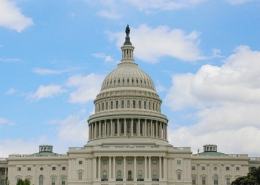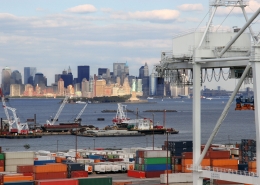On Wednesday, April 10th, Chair Maria Cantwell (D-WA) convened the Senate Committee on Commerce, Science and Transportation to discuss the renominations of National Transportation Safety Board (NTSB) Chair Jennifer Homendy and Surface Transportation Board (STB) Member Patrick Fuchs.
The NTSB and STB are both independent federal agencies tasked with conducting transportation oversight. NTSB oversees transportation safety and conducts investigations of all civil aviation incidents as well as major incidents for all other modes of transportation. The STB handles economic regulation of surface transportation modes with a primary focus on freight rail.
NTSB and Chair Homendy
The NTSB maintains a Board of five members, who are nominated by the president, require a Senate confirmation, and serve five-year terms. Amongst the Board members, the President also selects a Chair and Vice Chair who serve three-year terms with the chair requiring a separate Senate confirmation. Chair Homendy was first nominated to her position as Chair by President Biden in May of 2021 and confirmed by the Senate as the 15th Chair of the agency in August of the same year. She is now re-nominated for a new three-year term in the chair (PN 1498) as well as a new five-year term as a Board member (PN 1499).
In an increasingly complex transportation world, Chair Homendy has faced no shortage of transportation incidents during her first term in this capacity. The long list of transportation accidents was mentioned in a March hearing, and some of the more recent events reemerged during this hearing for updates. These included the familiar Boeing and Alaska Airlines door plug emergency as well as the Norfolk Southern derailment in East Palestine, but understandably, the prime focus of attention for members was the recent collapse of the Francis Scott Key Bridge in Baltimore which led to six presumed fatalities of construction workers.
On the Boeing front, the most significant update provided was that the maintenance records for the opening and closing of the door plug for the aircraft in question do not exist – an issue which Chair Homendy referred to as an “escape” from normal maintenance and safety process. While NTSB faced some early challenges in gaining cooperation from Boeing, after an exchange between Senator Ted Cruz (R-TX) and Chair Homendy in the March hearing mentioned above (00:43:00), NTSB and Boeing seem to be back on track.
The devastation of the collapse of the Francis Scott Key Bridge was the clear focal point for member questions. While the investigation is in preliminary phases, Chair Homendy shared that the NTSB team has conducted a laundry list of interviews related to the incident. They have also downloaded information from the ship’s voyage data recorder and had the original equipment manufacturer (Hyundai) in to examine the circuit breakers and other power systems. At this time, numerous entities have become parties to the investigation including Grace Ocean and Synergy, the United States Coast Guard, Maryland Transportation Authority, and the Association of Maryland Pilots. The investigation will continue for months to come, but Chair Homendy anticipates a preliminary report in the first week of May.
STB and Member Patrick Fuchs
The STB also carries a board of five individuals, including a chair, who are presidentially nominated, subject to Senate confirmation, and serve five-year terms. Fuchs was first nominated to his position as a member of the Board by President Trump in March of 2018. He was renominated by President Biden in January of this year.
While not the attention grabber like the NTSB, the STB plays a pivotal role ensuring transparency and accountability in rail shipping. During his testimony, Fuchs rattled off a list of high points of the many accomplishments and undertakings of the Board during his tenure including implementing costumer protections for those facing railroad demurrage and other charges, streamlining relief in the emergency service process and market dominance inquiry, examining cases and issuing more than 2,000 decisions and orders, considering the first major merger in more than 20 years, and overseeing the first significant transaction in more than 10 years, among others.
During the Q&A with Fuchs, members were highly focused on the themes of cooperation, transparency, and a balance between fairness and competition echoed throughout his testimony. Fuchs espoused the need for an evenhanded and independent approach for solving rate and service disputes which allows the market to function while reserving the authority to intervene when necessary.
Summary
While the committee peppered the candidates for renomination with questions ranging from Boeing and the Francis Scott Key Bridge to an ongoing arbitration involving BNSF and the Port of Vancouver over rail access rate fairness, the tone of the hearing was one of appreciation for the work done by both individuals and their corresponding agencies. Having previously served as Congressional committee staff, both Chair Homendy and Fuchs were unwavering in their dedication to public service and desire to serve their agencies and advocate for effective transportation policies.


